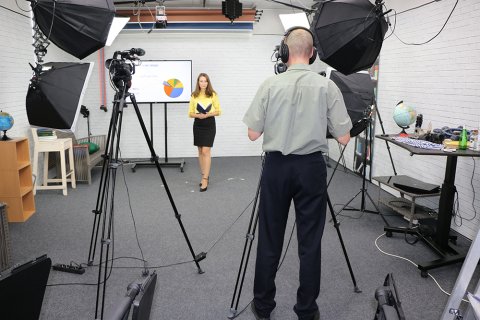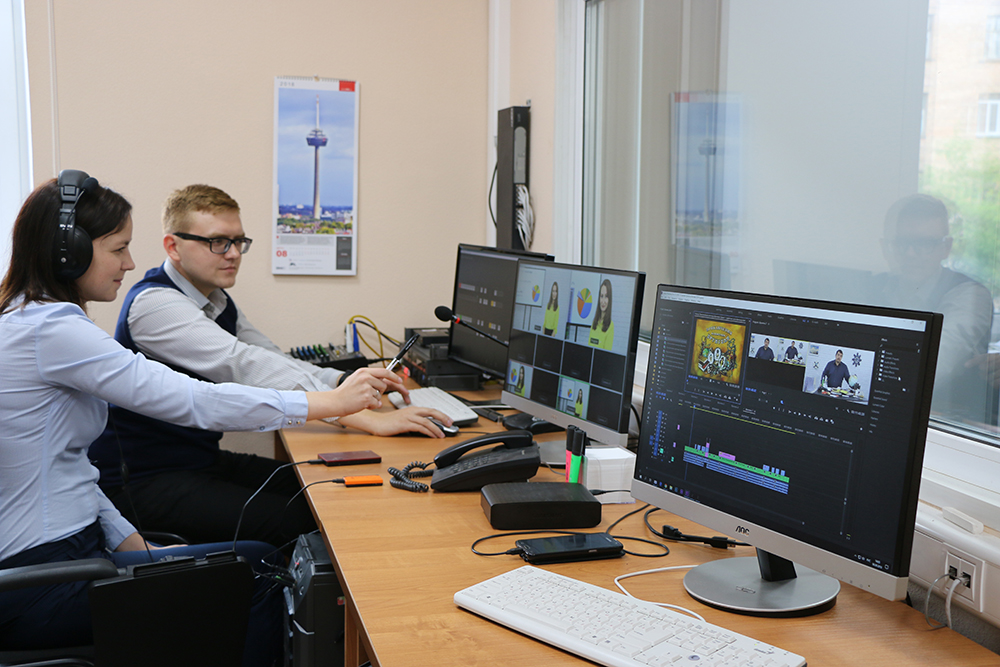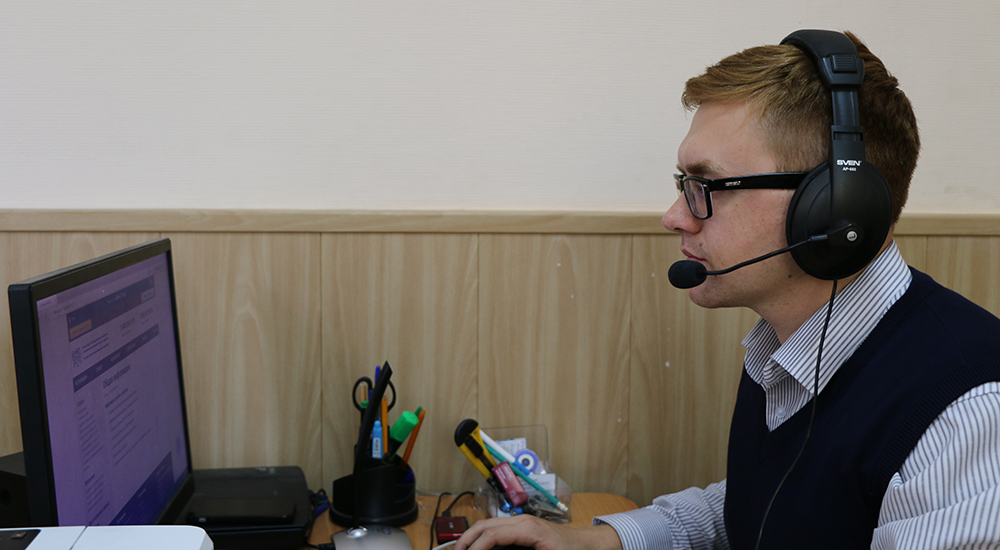If you want to get high-quality education, but for some reason you cannot study full-time or part-time, the solution is simple, you should study online. Modern technology and means of communication, including the Internet, are helping in it, therefore, distance education is becoming increasingly popular. The Institute of Open and Distance Education (IODE) of South Ural State University, which is headed by the Candidate of Sciences (Economics), Associate Professor Alexander Demin is the best choice.
The Institute of Open and Distance Education is the subdivision of South Ural State University and provides all structural units of the university, interested individuals and organisations with a wide range of educational, consulting and technical services.
For the convenience of training, the Institute posts all the university’s curricula on the “Electronic SUSU” educational portal, where you can find over 500 various courses for schoolchildren, students, postgraduates, teachers and public officers.
SUSU IODE staff masters modern educational technologies
Benefits of Education
Access to education is open anywhere in the world: for example, you can listen to lectures in Russian staying in Mongolia, Turkey or the United States. You can study in flexible hours in a relaxed atmosphere, or combine education with work. Educational content is easily accessible, and the interaction with the teacher is carried out quickly and effectively due to the use of modern technologies in the educational process. In addition, the cost of distance learning is much lower than that of full-time or part-time studies.
There is an opinion that distance education cannot be considered complete, but this is not true. It is not a question of the distance between a student and a teacher, but rather of the level of the teacher’s qualification and the student’s diligence. Teachers of the IODE are actively engaged in science and generously share knowledge with students. For example, the Department of Engineering, Technology and Construction has been carrying out research to improve the energy efficiency of draft units of boiler plants at the Magnezit plant.
In addition, the self-isolation regime did not affect the work of the Institute; on the contrary, the Institute became the flagship in the university.
Educational Process Implementation
At present, the Institute is implementing a programme of distance training for students using the e-learning system with the latest informational Internet technology and multimedia. For the convenience of learning, all university programmes are available on the Electronic SUSU educational portal. Thanks to this, a student can keep in touch with the teacher and return to the content of classes at any time. For successful education, the portal has almost everything you need: theoretical materials, algorithms for solving problems, tips that you can use in case of difficulty, training tests and reference materials. The student has the opportunity to "attend" an online lecture personally or watch it later in the recording. If something is not clear, you can master it using other resources.
The principle of training in the IODE is as follows: all students are divided into groups regardless of their number. They get password access to the server, which contains electronic textbooks, curricula, and individual training schedules. There are electronic record books, which indicate the tests/exams on what courses to pass and when. For each course, a forum is always held, the reports on which are evaluated by the teacher like the reports in a seminar. Also on the forums and in chats you can get advice from a teacher or tutor.
IODE keeps up with the times
Fields of Work
The Institute includes two departments: the Department of Engineering, Technology and Construction, which has a Laboratory of Computer Modelling; and the Department of Modern Educational Technologies, with a Laboratory of Distance Education, and a Laboratory of Adaptive Testing and a MOOC (massive online open courses) Production Studio.
The fields of work of the Laboratory of Computer Modelling inclde: computer engineering simulation of processes in power machines; design optimization and increasing of efficiency coefficient; strength calculations by methods of computer modelling of the bodies of energy transforming machines and mechanisms, rotors and so on; determination of critical frequencies, fatigue and durability calculations; calculation of building structures; computer simulation of physical processes: heat transfer, combustion, mass transfer, gaseous and liquid media flow.
The Laboratory of Computer Modelling has its own methods of high-precision computer simulation of physical systems, mechanisms and energy machines; it uses in-house software products.
The specifics of the technology of work of the Laboratory of Distance Education at the Department of Modern Educational Technologies consist in the fact that the educational process is based on the focused and strictly controlled intensive independent work of students who can study in a place convenient for them and at a convenient time, having a set (case) of teaching aids, including methodological instructions, manuals and textbooks, audio materials.
The Laboratory of Adaptive Testing was created to control knowledge. The MOOC Production Studio is developing massive online open (free) courses (MOOC), which allow to show the advantages of education at SUSU to an unlimited number of students from around the world, with different interests and levels of training, and form the brand of the university.
Participation in Projects
As other SUSU subdivisions, the Institute participates in projects and competitions. Thus, in 2019, it took part in two grants.
The first one was “Training of academic staff and employees of employer organisations for the implementation of modern continuing education programmes”, within the Federal project “New Opportunities for Everyone”. As part of the grant, more than one thousand teachers from five regions of the Russian Federation took advanced training at the Institute.
The second project was related to the creation of centres of innovative educational technologies to conduct classes using interactive teaching aids, workshops and other events at the Tajik Technical University named after academic M.S. Osimi. Within its framework, the IODE prepared a methodological and technical environment for training using modern educational technologies for the partners.
SUSU IODE makes education accessible for everyone
Who Does IODE Train?
Bachelor’s degree programmes
- “Construction Engineering”, profile “Industrial and Civil Engineering”. Graduate’s professional career: construction and mechanical foreman (repair and construction), foreman, maintenance and test engineer, buildings and structures maintenance engineer, design and estimate work engineer, section foremaster, head of department, head of construction organisation;
- “Informatics and Computer Engineering”, profile “Computing Machines, Complexes, Systems and Networks”. Graduate’s professional career: IT department officer, programmer, system administrator, software and hardware systems and hardware components developer, system and application software programmer, information systems developer, network structure administrator, traffic manager;
- “Power Industry and Electrical Engineering”, profile “Electric Drive and Automation of Industrial Plants and Technological Complexes”. Graduate's professional career: design engineer for integrated automation systems, setup engineer for automated electric drives, setup engineer for automation systems for technical processes, electric drives and automation systems design engineer, all-level industrial automation systems programmer, electrical and automation equipment supply manager, electric drives and automation systems sales manager, engineer in the field of operation and maintenance of electrical equipment, specialist in the field of automation of buildings and structures, leading engineer in the field of automated electric drives, leading automation engineer;
- “Design Engineering Support of Mechanical Facilities”, profile “Mechanical Engineering Technology”. Graduate’s professional career: production foreman, head of sections and workshops of mechanical engineering enterprises, design engineer in various design and engineering organisations and business units, process engineer, software engineer for modern numerically controlled machine tools, labour rate setting and work planning engineer, modern technological complexes operator, staff member of research units and laboratories of technology study;
- “Metallurgical Engineering”, profile “Steel Electrometallurgy”. Graduate’s professional career: metallurgical engineer, welding engineer, combustion engineer, thermal physics engineer, environmental engineer, new metal alloys designer, moulder, material engineer, metallurgical equipment supervisor;
- “Economics”, profile “Finance and Credit”. Graduate’s professional career: lead specialist (department, division), finance manager, head of financial department, chief financial officer;
- “Management”, profile “Financial Management”. Graduate’s professional career: lead specialist (department, division), head of section, head of department;
- “State and Municipal Management”, profile “State and Municipal Management”. Graduate’s professional career: department specialist, head of department, service, chief department specialist;
- “Jurisprudence”, profile “Civil Law”, “Criminal Law”. Graduate’s professional career: lawyer, attorney, notary;
- “Pedagogical Education”, profile “Modern Educational Techniques”. Graduate’s professional career: management specialist in education, preschool teacher, school counsellor.
Master’s degree programmes
- “Economics”, profile “Financial Management”. Graduate’s professional career: lead specialist (department, division), finance manager, head of financial department, chief financial officer;
- “State and Municipal Management”, profile “State and Municipal Financial Management”. Graduate’s professional career: chief department specialist, head of department, service;
- “Jurisprudence”, profile “Civil Law”. Graduate’s professional career: lawyer, attorney, notary.
- Starting from the new academic year, within the framework of the programme “Pedagogical Education”, profile “Learning Technologies in Digital Educational Environment” is opened, with the qualification “Master of Pedagogy”. Graduate's professional career: specialist in the organization of the educational process using digital technologies, he/she can be engaged into the implementation of Internet projects, distance learning courses, and increase the level of students' media literacy.
Those who usually choose these options are part-time students, who are already employed. Therefore, the programmes of training are always in demand.
State-financed Places as per Fields of Training
In the 2020/2021 academic year, 70 state-financed places have been allocated for full-time Bachelor’s degree programmes:
- Major “Construction Engineering”, profile “Industrial and Civil Engineering” – 20;
- “Power Industry and Electrical Engineering”, profile “Electric Drive and Automation of Industrial Plants and Technological Complexes” – 15;
- “Design Engineering Support of Mechanical Facilities”, profile “Mechanical Engineering Technology” – 25;
- “Metallurgical Engineering”, profile “Steel Electrometallurgy” – 10.
Live broadcast with the Director of the SUSU IODE Alexander Demin (on the right)
SUSU IODE Partners
The partners of the Institute are various enterprises and companies.
Thus, the partners of the Department of Engineering, Technology and Construction are the following: Asha Metallurgical Plant, PAO "Agregat" in Sim, Asha Lighting Engineering Plant; FGUP “Instrument Making Factory” in Trekhgorny, Production Association “Mayak”, Magnezit Plant in Satka, Ust-Katav Car-Building Plant.
The Department of Modern Educational Technologies cooperates with the regional authorities and administration: the Legislative Assembly, the Main Directorate for Labour and Employment of the Population, the Main Directorate of Material Resources, the Committee for Property and Land Relations of Chelyabinsk and the Chelyabinsk Region, the Pension Fund of the Russian Federation branch in the Chelyabinsk Region, as well as big enterprises, including SoyuzPishcheprom, AO Makfa; PAO Chelyabenergosbyt.
Programs of Cooperation with Foreign Universities and Educational Centres
At present, on the portal of the SUSU distance education there are many different courses for schoolchildren. As part of pre-university training, the qualifying stages of on-line Olympiad rounds among students and schoolchildren, and research on distance learning techniques are carried out; the SUSU Open School, which is an educational information environment that extends and complements the general education system, is operating. The School aims at providing additional opportunities for the development of educational and cognitive interests, contributing to the formation of readiness for self-determination in life, helping in planning a professional career.
The program of cooperation with a foreign university operates within the framework of cooperation with the Rudny Industrial Institute, Republic of Kazakhstan, in the field of research, development and measures to transfer knowledge. In particular, it is the implementation of the international project “Technical and higher professional education in construction specialties in accordance with the requirements of the labour market of the Republic of Kazakhstan and Russia”, aimed at creating the conditions for the development of dual education through the close integration of educational innovations and practice. And also it includes the introduction of the “Double Degree Education” programme for IODE students studying in technical fields, in the framework of cooperation with South Ural State University.
In addition, the interaction with the Tajik Technical University named after academic M.S. Osimi, which the Institute assists in the implementation of a unique package of distance learning, is being carried out.
Practical Training of Students
All students of the Institute take internships and pre-graduation practical training, provided for by the curriculum of their fields of study, at the IODE's partner-enterprises.
Internship is carried out in order to consolidate theoretical knowledge, introduce students to the specifics of their future production activities, prepare them for independent work, develop organizational skills in students, and form their professional competencies. The main goal of pre-graduation practice is to obtain practical skills in the field of professional activity and prepare for writing final qualification work, in connection with which the section of pre-graduation practice is included on the course “Final State Certification” on the Electronic SUSU 2.0 portal.
During the practice period, students keep a record and perform an individual task, and upon completion, provide a practice report signed by the head of the enterprise.

SUSU IODE is located here
If You Have Any Questions
Additional information can be found at the following address: Office 107, 76A Lenin Prospekt, Chelyabinsk 454080.
Telephone: 8-800-300-20-80 (the call is free in the Russian Federation territory), +7(351)267-98-10.
WhatsApp, Viber: +7 (919) 405-93-30. E-mail: iodo[at]susu[dot]ru.
Opening hours: weekdays – from 9:00 till 17:00, lunch time from 12:00 till 13:00. Saturday – from 9:00 till 14:00 without lunch break. Sunday – closed.
Time difference with Moscow: + 2 hours (UTS +5).








.JPG)